

The Drug Science Podcast
Drug Science
Professor David Nutt has spent a career making the argument for a rational, evidence-based approach to drug policy and drug use. The scientific evidence still challenges perceived wisdom on drugs and for that reason can appear to be contentious. In this podcast, the Professor explores the actual harms and potential benefits of various drugs, challenging myths surrounding classification and legislation, and exploring the societal impact of poorly informed drug policy. Using evidence in public policy should not be controversial. A podcast for anyone interested in understanding the scientific truth about drugs, free from political or moral concern.
Episodes
Mentioned books
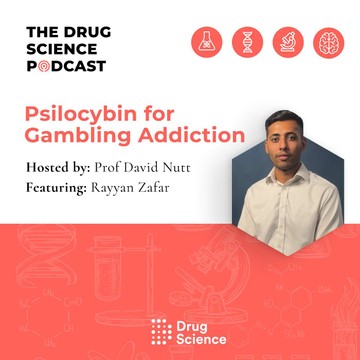
Dec 6, 2023 • 27min
92. Psilocybin for Gambling Addiction with Dr Rayyan Zafar
In the first of our LIVE Psilocybin Series, David Nutt speaks to Rayyan Zafar a final year PhD student at Imperial College London. Rayyan discusses his interest of the connection between the mind and the brain and how it led to his research into using psychedelics to treat addiction. Rayyan delves into various behavioural and neurochemical theories into why dependency occurs and highlights neuroimaging studies which indicate these varied reactions. He further goes on to discuss his current research in using psychedelics to treat addiction and why this treatment is proven to be so successful. AddictionMDMACocaineLSDPsilocybin KetamineNeurotransmittersDopamineCompass PathwaysBill Wilson AA PsychedelicsBecome a drug science community member
★ Support this podcast ★
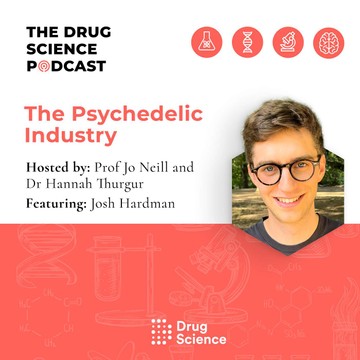
Nov 23, 2023 • 1h 2min
91. The Psychedelic Industry with Josh Hardman
Josh Hardman, founder of Psychedelic Alpha, discusses the challenges faced by the psychedelic industry including progress of decriminalisation, clinical trial milestones, and the potential evolution of the industry. They also touch on the current state of decriminalization in Oregon and Colorado, challenges in accessing regulated psilocybin, real-world evidence collection, drug development models, and the importance of in-person events in the psychedelic industry.

Nov 8, 2023 • 1h 3min
90. Investing in Psychedelics with Dustin Robinson
In this episode, Prof Jo Neill and Dr Hannah Thurgur sit down with Dustin Robinson, the visionary founding partner of Mr. Cannabis Law and a co-founder of Mr. Psychedelics Law. These law firms possess the expertise needed to navigate the intricate and strictly regulated realms of cannabis and psychedelics, addressing a wide range of legal and business challenges within these unique industries.Their discussion covers a range of thought-provoking topics, including US drug policy and reform, the intricate relationship between mental health and these substances, issues around integration of indigenous psychedelics into Western medicine, and the challenges surrounding research funding. Mr Cannabis LawMr Psychedelic LawAdventure Capital FirmKetaminePsilocybinMDMADMTPTSDKetamineTelehealthSmall PharmaMAPS MDMA TrialCompass PathwaysDecriminalise NatureThe Beckley Foundation AwaknSupport the Podcast
★ Support this podcast ★

Oct 25, 2023 • 1h 32min
89. David Vs David with Dr David Erritzoe
Recorded live from the launch event of David Nutt's latest book, "Psychedelics: The Revolutionary Drugs That Could Change Your Life – a guide from the expert," in this episode Dr. David Erritzoee and David Nutt engage in a discussion about Psychedelics. During the conversation, David Nutt provides valuable insights into the research that initially ignited his interest in Psychedelics and narrates his career journey from chairing the Advisory Council on the Misuse of Drugs to becoming a co-chair of Drug Science. Psychedelics: The revolutionary drugs that could change your life – a guide from the expertSentiaPsilocybinMDMAAntidepressants DepressionLSD DMT AyahuascaAmphetamineNitrous OxideKetamineCannabisEquasy — An overlooked addiction with implications for the current debate on drug harmsAustralia using MDMA and Psilocybin as MedicineSupport the podcast
★ Support this podcast ★
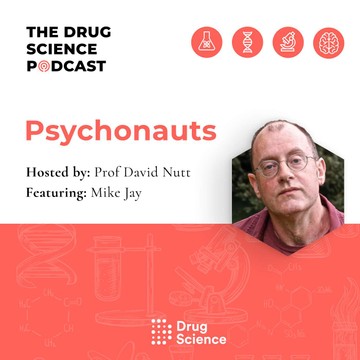
Oct 11, 2023 • 49min
88. Psychonauts with Mike Jay
In this episode, Mike Jay explores the contents of his latest book titled "Psychonaut," which offers a thought-provoking and unique account of the scientists, writers, artists, and philosophers who engaged in drug exploration to uncover the enigmatic realms of the mind. The podcast delves into the historical perspective of psychedelics, shedding light on the evolving societal perceptions of these substances. Moreover, it seeks to rediscover a forgotten intellectual legacy of drug experimentation that contributed to the development of psychology, the exploration of the unconscious, and the rise of modernism. The High Society book Mescaline BookPsychonauts BookBrave New World BookThe Doors of Perception BookCocaine Papers Sigmund Freud AlcoholCocaineNitrous OxideCannabisLSDAddictionSupport the podcast
★ Support this podcast ★
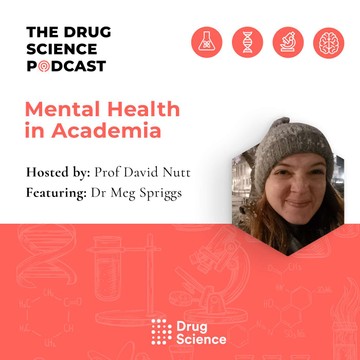
Sep 27, 2023 • 38min
87. Mental Health in Academia with Dr Meg Spriggs
In this episode, Meg Spriggs shares her firsthand experience dealing with the challenges mental health while pursuing her studies in academia. She candidly talks about the difficulties she faced with anorexia and mood disorders which led to her investigating the potential of psilocybin for treating Anorexia Nervosa. During the discussion, Meg reveals the shame she felt was associated with various mental health conditions and the consecutive impact this had on her; emphasising the significance of open communication when it comes to mental health, stressing the need for more dialogue and understanding in both the workforce and academia. Additionally, she underscores the importance of prioritising overall wellbeing within these environments. Anorexia NervosaPsilocybinAntidepressantsBeat Eating Disorder SupportSupport the podcastMeg’s Writing Support Meg’s writing
★ Support this podcast ★
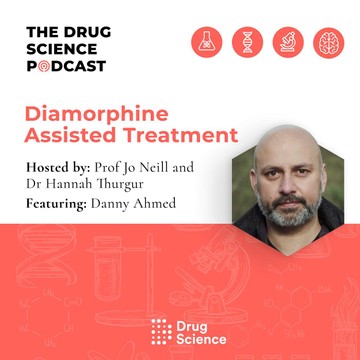
Sep 13, 2023 • 58min
86. Diamorphine Assisted Treatment with Danny Ahmed
In this episode, Jo Neill, and Hannah Thurgur are joined by Danny Ahmed, a highly experienced Registered Mental Health Nurse and Integrated Psychotherapist with over two decades of expertise. Together, they delve into a comprehensive discussion on a variety of harm reduction techniques. Throughout the episode, Danny shares his wealth of insights into the complex world of harm reduction. The conversation spans a broad spectrum of topics, including drug consumption rooms, the notion of ‘recovery’ and women who use drugs amongst much more. Danny offers an enlightening look into the multifaceted world of harm reduction. His expertise not only illuminates effective strategies but also underscores the importance of employing compassionate and empathetic approaches when supporting individuals on their path to well-being. Harm reductionNaloxoneMDMAHeroin CocaineAlcoholBenzodiazapinesMethadoneFentanylBuprenorphineSynthetic opioidsOverdose prevention centresRIOTT trials Project ADDERAlcoholics AnonymousPolydrug useNaloxoneOrder NaloxoneBuddyup AppSupport the Podcast
★ Support this podcast ★

Aug 30, 2023 • 50min
85. MDMA, Ketamine and Cannabis with Prof Valerie Curran
In this episode, Professr Valerie Curran, discusses the psychological effects of drugs that act on the human brain. Valerie Curren holds the position of Professorial Fellow in the Neuroscience of Addiction and Mental Health Program at ACU's Healthy Brain and Mind Research Centre. She has an esteemed background as an Emeritus Professor of Psychopharmacology at University College London (UCL), having established the UCL Clinical Psychopharmacology Unit in 1996. Furthermore, she is a founding member of the charity Drug Science and serves as an advisor to the UK All Party Parliamentary Group on Drug Policy Reform.Tune in to learn about her latest research into the short- and long-term effects of psychoactive drugs on mental health, cognition, memory and the brain as well as how CBD combined with psychological therapy may aid the treatment of cannabis use disorder.BenzosMDMAAlcoholCannabisCBDTHCKetamineMDMA midweek blues paper – in journal Addiction (mid 90s) Inappropriate benzodiazepine use in elderly patients and its reduction Combined and individual effects of CBD and THC on memoryDavid Nutt and Psilocybin in Australia Cannabis potencyCBD treating clinical psychosisCBD in treating cannabis use disorderProject 2021Medical cannabis reducing opiate useJon snow takes cannabis Endocannabinoid systemSupport the podcast
★ Support this podcast ★
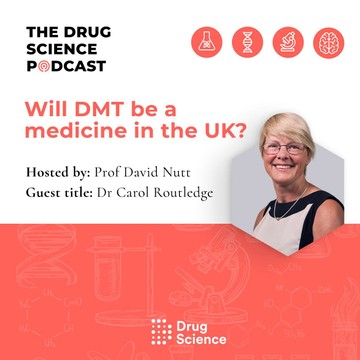
Aug 16, 2023 • 55min
84. Will DMT be a medicine in the UK? with Dr Carol Routledge
Join us for an insightful episode featuring Dr. Carol Routledge, a distinguished senior scientist and the Chief Medical and Scientific Officer at Small Pharma Labs. Dr. Routledge takes us on a journey through her remarkable career path that ultimately led her to work at Small Pharma. With a wealth of experience in both preclinical and clinical settings, she has delved into psychiatric and neurological indications, honing her expertise in understanding and treating mental health disorders.In this conversation, Dr. Carol Routledge draws upon her extensive clinical and psychedelic research background to shed light on the latest developments in DMT research and psychedelic integration therapy. With her profound insights, we explore the potential of these groundbreaking approaches to become formal medicines, revolutionizing the field of mental health treatment.Tune in as Dr. Carol Routledge shares her passion for advancing mental health treatments through innovative research. DMT DepressionSerotoninNor adrenaline Small PharmaChris Timmermann - Human brain effects of DMT assessed via EEG-fMRICMC British technology group (BTG)SSRI Psychedelic experienceAlzheimers research uk
★ Support this podcast ★

Aug 2, 2023 • 49min
83. Australia medicalises MDMA and psilocybin with Peter Hunt
In this episode, Peter Hunt discusses the journey which led himself and his wife co-founding Mind Medicine in Australia. Mind Medicine work to alleviate the suffering and suicides caused by mental illness in Australia through expanding the treatment options available to medical practitioners and patients, particularly through the establishment of safe and effective psychedelic-assisted therapies.Delving into the heart of their mission, Peter Hunt explores the groundbreaking potential of psychedelic-assisted treatments in addressing a wide range of mental illnesses. Mind Medicine Australia's commitment to providing accessible and innovative therapies shines through every step of their path.Peter delves into a comprehensive discussion of the recent developments surrounding the rescheduling of Psilocybin in Australia, shedding light on both the obstacles faced and the triumphs achieved throughout the process.Trigger Warning: Sexual assault and rapeMind MedicineMDMAPsilocybinDepressionAlcoholAddictionPTSDChildhood abuseSSRI antidepressantsCovid-19AnorexiaTherapeutic goods administrationAustralia Psilocybin Rescheduling
★ Support this podcast ★


